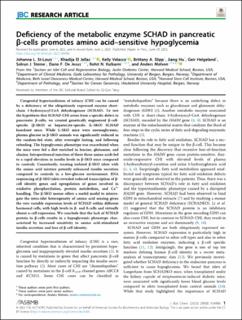| dc.contributor.author | St-Louis, Johanna L. | |
| dc.contributor.author | el Jellas, Khadija | |
| dc.contributor.author | Velasco, Kelly | |
| dc.contributor.author | Slipp, Brittany A. | |
| dc.contributor.author | Hu, Jiang | |
| dc.contributor.author | Helgeland, Geir | |
| dc.contributor.author | Steine, Solrun | |
| dc.contributor.author | De Jesus, Dario F. | |
| dc.contributor.author | Kulkarni, Rohit N. | |
| dc.contributor.author | Molven, Anders | |
| dc.date.accessioned | 2023-10-04T08:35:01Z | |
| dc.date.available | 2023-10-04T08:35:01Z | |
| dc.date.created | 2023-09-26T19:18:11Z | |
| dc.date.issued | 2023 | |
| dc.identifier.issn | 0021-9258 | |
| dc.identifier.uri | https://hdl.handle.net/11250/3094041 | |
| dc.description.abstract | Congenital hyperinsulinism of infancy (CHI) can be caused by a deficiency of the ubiquitously expressed enzyme short-chain 3-hydroxyacyl-CoA dehydrogenase (SCHAD). To test the hypothesis that SCHAD-CHI arises from a specific defect in pancreatic β-cells, we created genetically engineered β-cell-specific (β-SKO) or hepatocyte-specific (L-SKO) SCHAD knockout mice. While L-SKO mice were normoglycemic, plasma glucose in β-SKO animals was significantly reduced in the random-fed state, after overnight fasting, and following refeeding. The hypoglycemic phenotype was exacerbated when the mice were fed a diet enriched in leucine, glutamine, and alanine. Intraperitoneal injection of these three amino acids led to a rapid elevation in insulin levels in β-SKO mice compared to controls. Consistently, treating isolated β-SKO islets with the amino acid mixture potently enhanced insulin secretion compared to controls in a low-glucose environment. RNA sequencing of β-SKO islets revealed reduced transcription of β-cell identity genes and upregulation of genes involved in oxidative phosphorylation, protein metabolism, and Ca2+ handling. The β-SKO mouse offers a useful model to interrogate the intra-islet heterogeneity of amino acid sensing given the very variable expression levels of SCHAD within different hormonal cells, with high levels in β- and δ-cells and virtually absent α-cell expression. We conclude that the lack of SCHAD protein in β-cells results in a hypoglycemic phenotype characterized by increased sensitivity to amino acid-stimulated insulin secretion and loss of β-cell identity. | en_US |
| dc.language.iso | eng | en_US |
| dc.publisher | Elsevier | en_US |
| dc.rights | Navngivelse 4.0 Internasjonal | * |
| dc.rights.uri | http://creativecommons.org/licenses/by/4.0/deed.no | * |
| dc.title | Deficiency of the metabolic enzyme SCHAD in pancreatic β-cells promotes amino acid–sensitive hypoglycemia | en_US |
| dc.type | Journal article | en_US |
| dc.type | Peer reviewed | en_US |
| dc.description.version | publishedVersion | en_US |
| dc.rights.holder | Copyright 2023 the authors | en_US |
| dc.source.articlenumber | 104986 | en_US |
| cristin.ispublished | true | |
| cristin.fulltext | original | |
| cristin.qualitycode | 2 | |
| dc.identifier.doi | 10.1016/j.jbc.2023.104986 | |
| dc.identifier.cristin | 2179158 | |
| dc.source.journal | Journal of Biological Chemistry | en_US |
| dc.identifier.citation | Journal of Biological Chemistry. 2023, 299 (8), 104986. | en_US |
| dc.source.volume | 299 | en_US |
| dc.source.issue | 8 | en_US |

